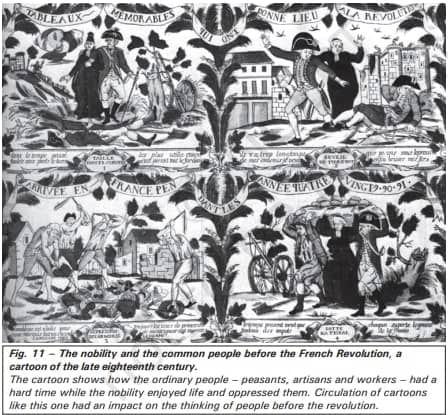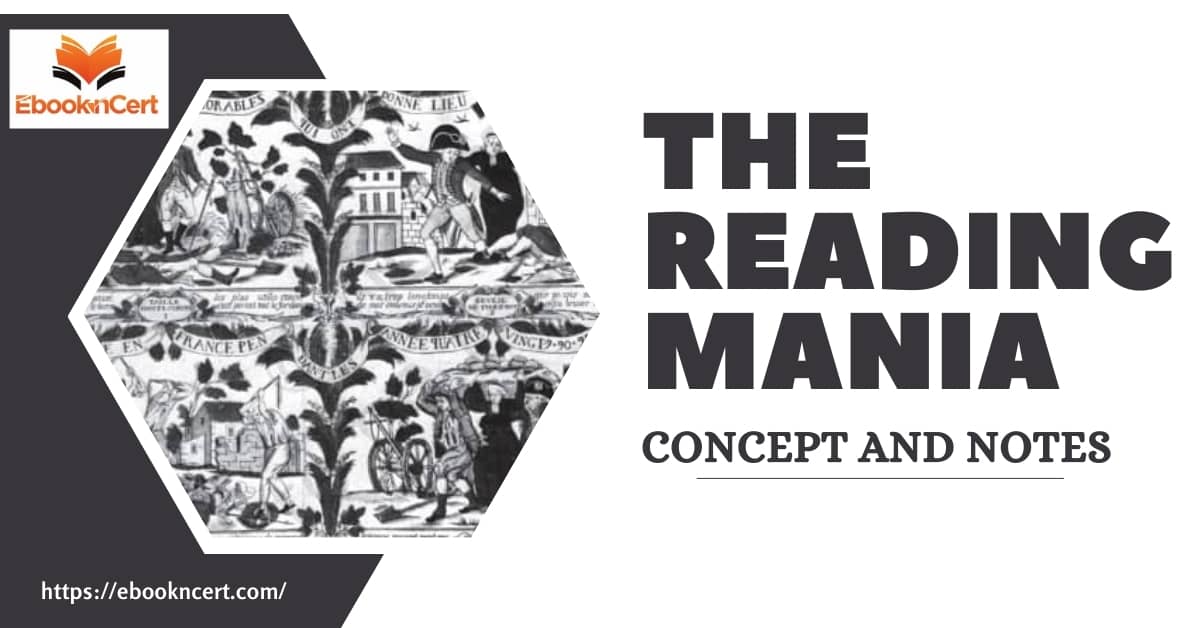Topic & sub-topics covered: The Reading Mania, ‘Tremble, therefore, tyrants of the world!’, Print Culture and the French Revolution: Print Culture and The Modern World (All single detail notes are exam-oriented).
We have discussed in-depth and exam-oriented pointers that can be asked in the board exam of class 10th about “The Reading Mania, ‘Tremble, therefore, tyrants of the world!’, Print Culture and the French Revolution” which is taken from the NCERT History book for class 10th chapter no. 5 “Print Culture and The Modern World“.
Download NCERT History Chapter 5 Class 10th Notes PDF for “Print Culture and The Modern World”
Topics Covered
ToggleIf you are in class 10th and looking for free NCERT History chapter 5 notes of the chapter Print Culture and The Modern World class 10 that cover concepts, then you can download the free class 10th History chapter 5 notes “Print Culture and The Modern World”. You should download this free PDF for future test or exam preparations.
NCERT Class 10 History Chapter 5 Print Culture And The Modern World Class 10th Notes & Concept
The Reading Mania
1. Increase in Literacy Rates:
- During the seventeenth and eighteenth centuries, literacy rates rose across Europe due to the establishment of church-run schools in villages.
- In some parts of Europe by the late eighteenth century, literacy rates reached as high as 60 to 80 percent, indicating widespread literacy.
2. Emergence of Popular Literature:
- Print led to the creation of new forms of popular literature, targeting diverse audiences.
- Booksellers utilized peddlers to distribute various reading materials, including almanacs, ballads, folktales, and chapbooks, catering to the entertainment needs of ordinary readers.
3. Development of Periodical Press:
- The periodical press evolved in the early eighteenth century, offering a blend of current affairs and entertainment.
- Newspapers and journals disseminated information about wars, trade, and global developments, enhancing people’s access to knowledge.
4. Accessibility of Scientific Ideas:
- Scientific and philosophical ideas became more accessible to the common people through printed texts.
- Ancient and medieval scientific texts were compiled and published, alongside maps and scientific diagrams, expanding the dissemination of knowledge.
5. Influence of Thinkers and Writers:
- Influential thinkers like Isaac Newton, Thomas Paine, Voltaire, and Jean Jacques Rousseau published their ideas, reaching a broader audience.
- Their writings on science, reason, and rationality became prominent in popular literature, shaping public discourse and intellectual thought.
‘Tremble, therefore, tyrants of the world!’
1. Perception of Books as Agents of Change:
- By the mid-eighteenth century, there was a widespread belief that books were instrumental in spreading progress and enlightenment.
- Many individuals held the conviction that books had the potential to transform society, leading to the liberation from despotism and tyranny.
2. Role of Printing Press in Promoting Enlightenment:
- Louise-Sebastien Mercier, an eighteenth-century French novelist, emphasized the profound impact of the printing press on societal progress.
- Mercier asserted that the printing press was the most powerful tool for advancing public opinion, which could ultimately overthrow despotic rule.
3. Empowerment through Reading:
- In Mercier’s novels, protagonists undergo significant transformations through reading.
- Characters immerse themselves in books, experiencing enlightenment and intellectual growth, thus highlighting the transformative power of reading.
4. Challenge to Tyranny:
- Mercier’s proclamation, “Tremble, therefore, tyrants of the world! Tremble before the virtual writer!” underscores the perceived threat that printed works posed to oppressive regimes.
- The declaration symbolizes the belief in the ability of printed materials to challenge and undermine authoritarian rule.
Print Culture and the French Revolution

1. Role of Print in Popularizing Enlightenment Ideas:
- Print culture disseminated the ideas of Enlightenment thinkers, such as Voltaire and Rousseau, who advocated reason over tradition and superstition.
- Enlightenment writings critiqued established institutions like the Church and the monarchy, challenging the legitimacy of traditional social orders.
2. Emergence of a Culture of Dialogue and Debate:
- Print facilitated open discussions and debates on societal norms and values, fostering a culture of critical thinking and inquiry.
- The public became more aware of the power of reason, leading to the questioning of existing ideas and beliefs, paving the way for new social revolutions.
3. Literature Criticizing Monarchy and Social Order:
- By the 1780s, there was a surge in literature mocking royalty and critiquing their morality, leading to widespread questioning of the existing social hierarchy.
- Cartoons and caricatures depicted the monarchy as indulging in sensual pleasures while the common people suffered, fostering discontent and opposition against the monarchy.
4. Complexity of Influence of Printed Material:
- While print aided the spread of ideas, individuals were exposed to a variety of literature, including monarchial and Church propaganda, alongside Enlightenment writings.
- People interpreted and synthesized diverse perspectives, accepting some ideas while rejecting others, indicating that print did not directly shape their minds but offered the possibility of independent thought.
Next & Previous Topics of NCERT/CBSE History Class 10 Chapter 5: Print Culture and the Modern World
Related Questions & Answers:
FAQ
Q1. How did the rise in literacy rates impact society during the seventeenth and eighteenth centuries?
Answer: The increase in literacy rates led to the emergence of popular literature, the development of the periodical press, and greater accessibility to scientific and philosophical ideas, fostering intellectual growth and societal progress.
Q2. What role did the printing press play in promoting enlightenment ideas and challenging tyranny?
Answer: The printing press served as a powerful tool for spreading enlightenment ideals and challenging oppressive regimes. Writers like Louise-Sebastien Mercier emphasized its role in advancing public opinion and empowering individuals to challenge despotism through literature.
Q3. How did print culture contribute to the French Revolution?
Answer: Print culture popularized Enlightenment ideas critiquing traditional social orders, fostering a culture of dialogue and debate. Literature mocking royalty and questioning social hierarchies, alongside the dissemination of diverse perspectives, contributed to discontent and opposition against the monarchy, paving the way for revolutionary change.


the the best website for notes while preparation 🏆
Thank you so much. Keep learning.